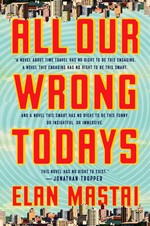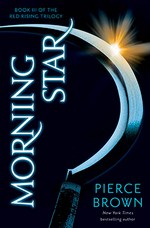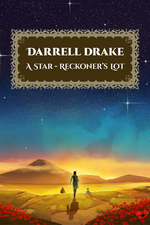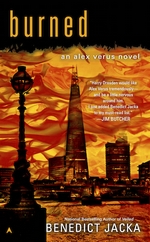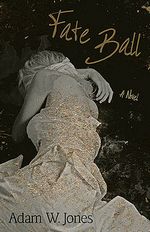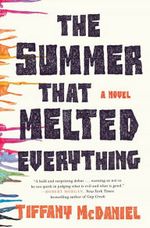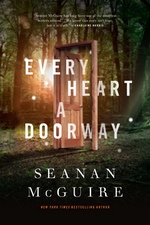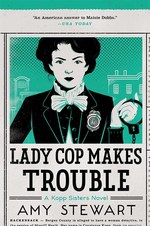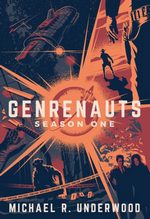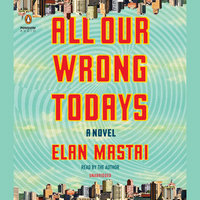 All Our Wrong Todays
All Our Wrong Todays
by Elan Mastai
DETAILS: Publisher: Penguin Audio Publication Date: Feb 7, 2017 Format: Unabridged Audiobook Length:10 hrs., 2 min. Read Date: April 4-6, 2023

This is largely a reworking of my post about the ARC for this novel that I received from Dutton via NetGalley, but there’s some new material thrown in as well.
What’s All Our Wrong Todays About?
Avery Brooks famously asked, “Where are the flying cars? I was promised flying cars! I don’t see any flying cars! Why? Why? Why?” Elan Mastai’s book finally provides the answer. Simply put: we had it—flying cars, routine space flights, robots/other tech dressing us, feeding us, doing the everyday jobs that need to be done so that humans can focus on working in labs to make the world an even better place, to make the next technological leap forward. Essentially, everything that Science Fiction of the 1950’s told us to expect, we lived in George Jetson’s world.
Until July 11, 2016 when the first time machine was turned on and things went wrong, resulting in 40 years of history being rewritten and one man—Tom Barren—was the only one to know that we are now living in a dystopia. It’s a dystopia for everyone on Earth, but Tom, that is—his life in the 2016 that we know is much better than it was in the “original” 2016. So now Tom has to decide, does he try to restore the timeline (if he can even figure out how to do so), or does he keep things the way they are?
That’s less than you can see on Goodreads/Mastai’s site/Web retailers—and yet I think I gave away too much. But really, that’s barely scratching the surface.
The Science Part of Science Fiction
There’s a great mix of detail to the science (at least the ideas and theories behind it), yet keeping it at the level where we don’t get bogged down in technicalities (and kept Mastai from having to work them out)—he gets away with it by comparing it to the way that we don’t really understand how hydroelectric dams or incandescent light bulbs work.
This is the way to do Science Fiction for me—give me just a hint about the science, enough to make it plausible, but don’t get me details. My eyes gloss over and I frequently skim it, especially if it goes too long. I’m sure this disqualifies me from being a Hard SF fan. But I’m okay with that.
Chapter 56
Oooh, boy. Speaking of things to skim—many readers (particularly a handful of those who read this space) will want to skim Chapter 56—or skip it entirely if they listen to the audiobook.
I think it’s a mistake to do so, but I get the impulse.
It’s the literary equivalent to that scene from The Wire‘s 4th episode—it’s a mixture of genius and profanity and poetry. Mostly profanity.
It consists of two words, both of which are some of the “bigger” words on Carlin’s list of words that you can’t say on TV, or some of the middle words in McWhorter’s Nine Nasty Words.
In the audiobook version, it’s 2 minutes long. Mastai does a masterful job of varying the way he utters each blue syllable to convey meaning and make it more than just a monotonous stream of profanity.
While glancing at his Twitter feed, I saw Matsai commenting that “I find it endlessly amusing that every few months [an image] this page of my novel goes viral.” It’s really kind of sad that this chapter gets this much attention when the rest of the chapters (which are better in so many ways) barely get any attention at all—at least that I can see.
Putting aside the couthness of the vocabulary—in context it works so well, it encapsulates everything going through Tom’s mind in the moment as he realizes just how monumentally everything has gone wrong with his impetuous move.
How’s Mastai’s narration?
It’s almost as good as his writing—and I loved the writing. As always, I get nervous when I see that a writer does their own audiobook narration, but Penguin knew what they were doing when they put him behind the microphone. He’s a natural performer and gets the emotions of every scene perfectly, the nuances for the characters, when to ratchet up the tension and when to let things relax.
It’s obvious when you think about it—but not every author is capable of conveying what they know about a book through a performance. Matsai is one of the exceptions. I’d pay to hear him narrate other people’s work, too.
So, what did I think about All Our Wrong Todays?
In my original post, I’d said, “We’re going to be talking about Elan Mastai the way we recently talked about Ernest Cline or Andy Weir next year (assuming I can predict anything)—and he deserves it.” Sadly, it appears that I can’t predict anything. Because we’re not–and we should be. The voice grabs you right away from the humor, the honesty—the trouble with time travel grammar. I really wish that Jonathan Tropper’s endorsement of the book wasn’t right there on the front cover, because it feels like a cheat to compare Mastai to him now, but I want to. He’s got the same mix of humor, heart, drama, and inspiration as Tropper, he just blends science fiction themes in with those. The Tropper comparison is from the original post, too—now I’d add a comparison to Mike Chen–it’s the same kind of mix of heart, family, and SF (although Chen’s work was published later).
Tom Barren’s a great character (a questionable person, but a great character) that you’ll love spending time with. There are really a lot of great characters here, but he’s the only one I feel safe discussing. There are characters with warts, strengths, weaknesses, courage, bravery, and humanity in all shapes and sizes—some noble, some despicable, some pathetic. As is frequently the case, seeing multiple versions of the same characters in the various timelines tells you a lot about the people and/or worlds they live in.
Tom’s father, the one who developed the time machine—has some fantastic theories about time travel—it’s not just about time, it’s about space (between the earth’s rotation, movement through space, etc.), and for time travel to be really possible, both have to be addressed. Not only does it clear the TARDIS from every critique of time travelers/machines mentioned in the book, but it’s a really, really good point.
It’s one of those magic books that you don’t want to end, because you’ll have to leave the characters and world—but that you can’t get through fast enough because you just have to know how it turns out.
Is it flawless? No, I’m sure it’s not, but unlike almost every other book I’ve read this year (including the ones I’ve loved), I can’t think of a single problem. That says a lot to me. On a re-read, I’m not still not sure I can point to a problem. There are scenes I don’t like—but that’s because they’re effective in portraying darkness, and they were right to do so. But a deficiency? Nope, can’t think of one.
I’d originally said, “I have not been able to stop talking about this book for a week now—I think my wife and kids have started ignoring me when I bring it up. All Our Wrong Todays is a book that practically demands over-hyping—it’s only a huge amount of restraint that keeps me from spilling everything. I have a list of people I want to buy this for (started compiling it when I was about 10% finished), and the list is currently long enough now that I wouldn’t be able to buy any books for myself until June 2017 — so, sorry everyone, buy your own.” I still can’t stop talking about it, and bring it up anytime someone asks about Time Travel fiction, SF with heart, or just someone needing a book that’s not their normal genre.
My original conclusion was this: “I don’t know if I’ll be able to watch/read more time travel again—especially time travel involving love stories—but man, it’s absolutely worth it if this was my last.” I’ve read 3-4 time travel books (and a couple of Doctor Who-tie ins) since then, so it wasn’t my last–but the only one that’s come close to being as good was Chen’s Here and Now and Then. I enthusiastically recommended it then, I’m just as enthusiastic in my recommendation now—in either format. I’m annoyed that it took me so long to come back to this as a re-read, and I’m promising myself I won’t put it off that long again.

This post contains an affiliate link. If you purchase from it, I will get a small commission at no additional cost to you. As always, the opinions expressed are my own.
![]()


